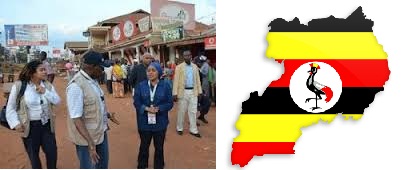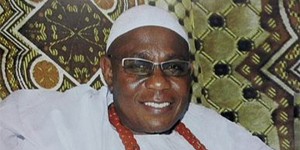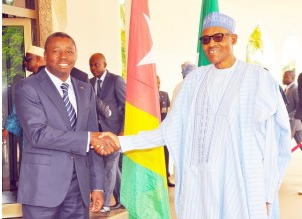Category Archives: African News
Obasanjo Faults Uganda’s Election As Museveni Wins 5th Term

The just concluded Uganda 2016 general elections have been reported to have been marked by a lack of a level electoral playing field, an increased prevalence of money in politics, alleged misuse of state resources, inequitable media coverage, and question marks over the secrecy of the ballot and the competence of the Electoral Commission to manage the process.
Former President of Nigeria and Chairman of the Commonwealth Observer Group to the Uganda 2016 General Elections, Olusegun Obasanjo, while delivering the observers’ interim assessment yesterday, said that, “once again these elections fell short of meeting key democratic benchmarks”.
Addressing journalists in Kampala, Obasanjo stated that, “while the presidential elections were competitive with regard to the number of candidates, practical restrictions on basic freedoms of assembly and movement affected the fairness of the campaign for opposition candidates.
“Moreover, the overall competitiveness of the campaign was compromised by a lack of transparency with regard to campaign financing. The Group noted with concern that the fusing of the state and ruling party in Uganda – highlighted by previous Commonwealth observers – had deepened, with a consequent adverse impact on political freedoms and further undermining any efforts to level the playing field for these elections.”
Obasanjo however commended the commitment shown by voters despite what he described as “inexcusable” delays at many polling stations.
In response to reported incidents of violence since the close of polls, the Chair said, “I reiterate my call to all Ugandans to allow the results process to conclude in an atmosphere of peace, and urge that any challenges be conducted through the legal process”.
The Commonwealth Observer Group, composed of eminent persons drawn from across the Commonwealth, was appointed by Commonwealth Secretary-General Kamalesh Sharma.
As voting ended in Uganda yesterday, amid concerns, incumbent President Yoweri Museveni, again coasted to victory by emerging the country’s president for a fifth tenure.
Museveni seized power in 1986 and is credited with restoring stability to Uganda just as critics believe that he is increasingly authoritarian.
The 71-year-old who defeated his closet rival, Kizaa Besigye, polled 60.75 per cent votes as against 35 per cent votes by his opponent.
With the victory, Museveni extended his 30 years in office.
The election was marred by sporadic violence and opposition allegations of electoral fraud, while the social media sites and messaging apps were blocked.
Reacting, Besigye who is under house arrest described the results as sham even as he called on the international community to reject the result.
“We have just witnessed what must be the most fraudulent electoral process in Uganda,” he said in a statement.
EU observers criticised the poll, saying that the governing party had created an intimidating atmosphere that the opposition alleged rigging.
The main opposition challenger Kizza Besigye was placed under house arrest on allegation that he would announce the results himself, breaking electoral laws, police said.
It is the fourth time Mr Besigye, candidate for the opposition Forum for Democratic Change, has taken on President Museveni.
The two men were once allies, with Mr Besigye serving as Mr
Museveni’s personal doctor when they were guerrilla fighters.
The next closest challenger to Mr Museveni, former Prime
Minister Amama Mbabazi, was also reportedly under house as voting took place.
Also, former Central African Republic prime minister Faustin-Archange Touadera, won a presidential run-off, the electoral commission announced on Saturday, in what was widely seen as a step towards reconciliation after years of violent turmoil.
According to a report by Reuters, Touadera won 62.71 per cent of votes cast in the Feb. 14 election, according to provisional results announced by National Elections Authority (ANE) president Marie-Madeleine Nkouet.
Anicet-Georges Dologuele, also a former prime minister, won 37.29 percent, reversing the two rivals’ rankings from the first round. Dologuele said he would accept the results, despite what he called “massive fraud” in the second round.
“For the sake of peace, I choose to respect the provisional results published by the ANE and to renounce an appeal to the constitutional court … and to recognise Faustin Archange Touadera as the leader of all central Africans,” he told reporters at his home shortly after the results were released.
Touadera’s spokesman called for calm and asked the country’s population of 5 million to accompany the new leader in his pursuit of “reconciliation and recovery”.
Foreign observers praised the peaceful nature of the polls but have not yet commented on Saturday’s results.
The election results must be certified by the Constitutional Court within eight days to become final.
Akure Monarch Pardons Eze Ndigbo
 Deji of Akureland, Oba Ogunlade Aladetoyinbo, has reconciled with Chief Gregory Iloehike, the dethroned Eze Ndigbo of Akure, capital of Ondo State. Iloehike was dethroned by the monarch about two weeks ago for allegedly disrespecting the traditional stool. Oba Aladeyoyinbo, however, said he could not reverse Iloehike’s deposition until the State Council of Obas takes a final decision on the chieftaincy title of Eze Ndigbo in the state.
Deji of Akureland, Oba Ogunlade Aladetoyinbo, has reconciled with Chief Gregory Iloehike, the dethroned Eze Ndigbo of Akure, capital of Ondo State. Iloehike was dethroned by the monarch about two weeks ago for allegedly disrespecting the traditional stool. Oba Aladeyoyinbo, however, said he could not reverse Iloehike’s deposition until the State Council of Obas takes a final decision on the chieftaincy title of Eze Ndigbo in the state.
The monarch stated this at the weekend in his palace during a peace meeting involving the leadership of Igbo community and top officials of the state government. The Igbo community leaders were led by government officials to publicly apologise to the monarch. The monarch also ordered that shops at Mojere market be reopened but warned the traders against causing any crisis over the leadership of the market until Akure traditional chiefs resolve the matter.
He assured Igbo indigenes that their interest would be taken care of in the market. Oba Aladetoyinbo appreciated the state government for its intervention as well as Akure youths and elders for their peaceful disposition towards the crisis.
According to him, the disputed title of Eze Ndigbo would be considered at the meeting of the state Council of Obas scheduled to hold next week. Speaking on behalf of the delegation, Ikechukwu Anoliefo said Igbo people had found Akure hospitable and they had been living in the ancient town for over 100 years. Anoliefo appealed to the Deji to forgive their errors, promising that such action would not repeat itself in the future.
Ghana Agrees To Pay Nigeria $170m Gas Debt By February
 The Ghanaian government has agreed to pay Nigeria a $170 million gas debt by February 2016 in a bid to avert a recent threat by a consortium of Nigerian companies to cut gas supply to Ghana over unpaid gas bill.
The Ghanaian government has agreed to pay Nigeria a $170 million gas debt by February 2016 in a bid to avert a recent threat by a consortium of Nigerian companies to cut gas supply to Ghana over unpaid gas bill.
Ghana receives gas from Nigeria through the $1 billion West African Gas Pipeline (WAGP), which transports Nigerian gas to the Republic of Benin, Togo and Ghana for power generation and other domestic uses.
N-Gas, which is jointly owned by Shell, Chevron and the Nigerian National Petroleum Corporation (NNPC), buys gas from oil companies in Nigeria and transports it to its customers in Benin, Togo and Ghana through the pipeline operated by the West African Gas Pipeline Company (WAGPCo).
Nigeria had threatened to cut gas supply to Ghana over $181 million the country owed N-Gas but after protracted negotiations by a strong Ghanaian delegation that came to Nigeria, a part payment was made and the country given the February 2016 deadline to settle the outstanding debt.
Reuters quoted a spokesman of Ghana’s Ministry of Power Kweku Sersah as saying in a statement yesterday that Ghana’s state power generating company, the Volta River Authority (VRA), would settle the debt to N-Gas in three tranches starting in November, adding that the terms were still being finalised.
“The high-powered delegation that went … (to the Nigerian capital Abuja) was able to negotiate for Nigeria Gas (N-Gas) to continue to supply the country the needed gas,” Sersah said in a statement posted on the ministry’s Facebook page.
VRA buys the gas to fire Ghana’s power plants mainly in the east of the country.
Hydro supplies around 50 per cent of Ghana’s power with the rest from its own gas and other sources.
Ghana’s government has promised to end crippling power blackouts by the end of the year.
Ghana gets around 25 per cent of its power through gas from Nigeria. The threat by N-Gas to reduce supplies by 70 per cent would have made it harder to achieve the government’s goal of tackling blackouts and could have raised the cost of supply.
President John Mahama had explained that the $103 million debt owed the Nigerian company by Ghana had existed since 2012.
According to him, Ghana began piling up the debt after a ship broke part of the pipelines that convey gas from Nigeria to Ghana through the West Africa Pipeline.
Mahama said Ghanaians must understand the circumstances that created the financial impasse.
“The debt dates back to 2012. We started incurring the debt when a ship broke one of the pipelines that supplied the gas from Nigeria, so the VRA had to purchase crude to power the machines for almost a year, and that affected their balance sheet a lot.
“So when the pipe was fixed and the gas started flowing, it had already frustrated the accounts of the VRA but currently, there is a plan in place to pay the debt and already, July and August have been sorted out,” the President told Kumasi-based Garden City Radio.
The West African Gas pipeline starts from Itoki area of Ogun State and goes through Agido near Badagry in Lagos, passing through 33 Nigerian communities before it goes offshore.
The space allocated to N-Gas in the pipeline could transport up to 200 million standard cubic per day of gas.
Shareholders in WAGPCo include Chevron, Shell, NNPC, Ghana’s Volta River Authority (VRA), BenGaz and Soto Gaz.
Science For Nature And People Hosts 2-year Rwanda Govt Natural Capital Accounting Initiative
 Following the adoption of the Sustainable Development Goals (SDGs) in New York, the Science for Nature and People (SNAP) partnership has announced a new Expert Working Group which will support the government of Rwanda’s development strategy and international initiatives in natural capital accounting.
Following the adoption of the Sustainable Development Goals (SDGs) in New York, the Science for Nature and People (SNAP) partnership has announced a new Expert Working Group which will support the government of Rwanda’s development strategy and international initiatives in natural capital accounting.
The SNAP Natural Capital Accounting Expert Working Group will spend two years assessing Rwanda’s development plans and modeling land use impacts in support of the country’s Economic Development and Poverty Reduction Strategies, Biodiversity Strategy and Action Plans, and Poverty and Environment Initiatives. The aim is to support policymaking that takes into account Rwanda’s natural capital, which is estimated to account for approximately 40%[1] of the country’s economic wealth, among the highest in the world.
Dr. Emmanuel Nkurunziza, Director General, Rwanda Natural Resources Authority (RNRA), said: “Rwanda is one of the fastest growing economies in Africa, yet our mountains, forests and wetlands, the wildlife that teems on our beautiful land, can only be a source of growth if we also protect them. Rwanda aims to become one of the first countries in Africa to quantify the benefits ecosystems bring. That will help us to more effectively manage our long-term growth, and also to achieve Sustainable Development Goals.”
The SNAP group brings together experts already active in the field, including from the Rwandan government, the World Bank WAVES (Wealth Accounting and Valuation of Ecosystem Services – see http://www.WavesPartnership.org) project and a Wildlife Conservation Society (WCS) project providing the government with critical information on the value of natural capital, and cultivating networks and institutional arrangements. Conservation organization WCS is one of the founding partners of the Science for Nature and People partnership, alongside The Nature Conservancy (TNC) and the National Center for Ecological Analysis and Synthesis (NCEAS) at the University of California, Santa Barbara.
Craig Groves, Executive Director, Science for Nature and People partnership, said: “In all countries the long-term value of natural capital is often ignored, leading to habitat destruction, with profound consequences for people’s health and quality of life, and frequently the economy. The Science for Nature and People partnership has brought these groups of experts together to help value Rwanda’s greatest resource – its natural environment. This initiative will protect communities and the economy long-term from the ill-effects of environmental degradation.”
Natural capital accounting links national economic accounts with natural capital, using the System of Environmental Economic Accounting (SEEA), adopted by the UN Statistical Commission in 2012 and now implemented in around 40 countries. The SEEA provides more comprehensive metrics to support decision-making for sustainable development.
Glenn-Marie Lange, World Bank, said: “While the SEEA provides agreed methodology for accounting for natural resources, the global community is now tackling the much more challenging problem of accounting for ecosystems and their services. The Science for Nature and People project in Rwanda will provide an exciting opportunity to contribute to this effort and to ecosystem accounting across Africa. The participation of senior government officials makes this effort all the more important by ensuring that the scientific work is policy relevant.”
About the Science for Nature and People partnership
Founded in 2013, the Science for Nature and People (SNAP) partnership is the world’s premier innovation engine of conservation science and sustainable development policy, partnering with public, voluntary and private sector organization around the world to transform the relationship between people and nature. Backed by The Nature Conservancy (TNC), the Wildlife Conservation Society (WCS) and the National Center for Ecological Analysis and Synthesis (NCEAS) at the University of Santa Barbara, SNAP funds, convenes and supports Expert Working Groups addressing challenges in four focus areas: Food Security and Nature, Water Security and Nature, Community Resilience and Climate Change, and Ecosystem Services and Biodiversity Benefits. SNAP has been generously supported by Angela Nomellini and Ken Olivier, Shirley and Harry Hagey, Steve and Roberta Denning, Seth Neiman, the Gordon and Betty Moore Foundation, Ward W. and Priscilla B. Woods, and the David and Lucile Packard Foundation.
BSMEC, Samsung, Hyundai Restate Commitment to $1.5bn Dockyard Project
The Badagry Ship Repair and Maritime Engineering Company (BSMEC), a consortium of five Nigerian companies and its technical partners, Samsung Heavy Industries and Hyundai Heavy Industries, have restated their commitment to the development of the ship repair project at Badagry, Lagos. Full Story
PMB, Eyadema Decry Loss Of $7bn Annually To Oil Theft
President Muhammadu Buhari and his Togolese counterpart, President Faure Gnassingbe Eyadema, lamented yesterday that the Gulf of Ginuea loses $7 billion to piracy and other illegal businesses on the waterways. Full Story




You must be logged in to post a comment.